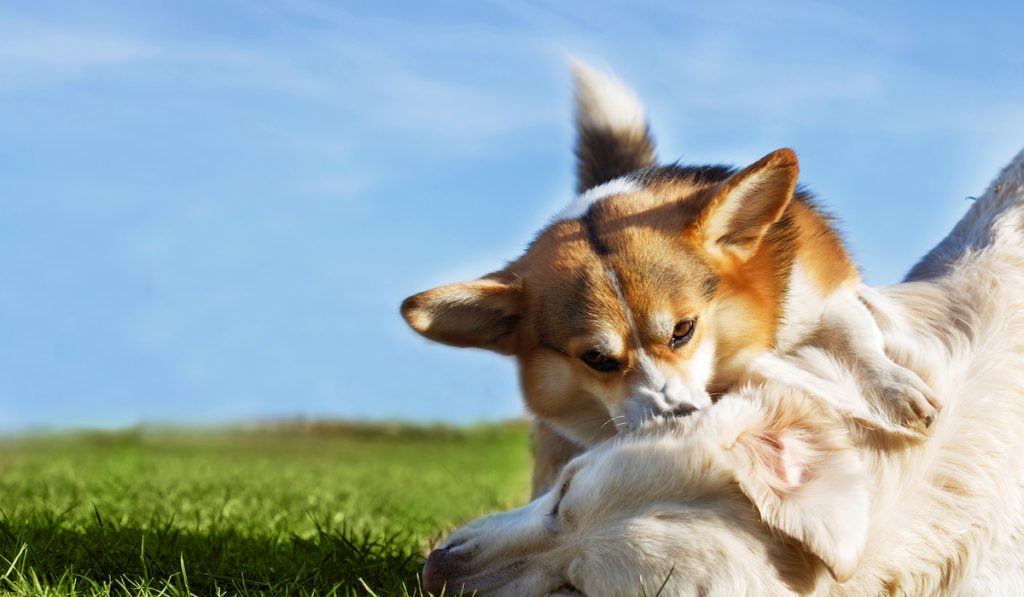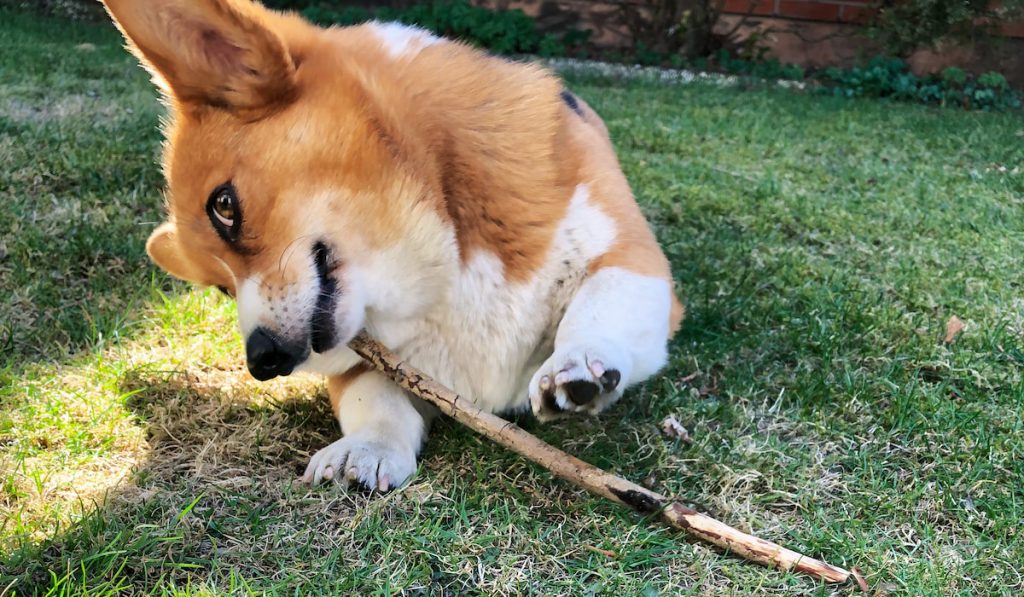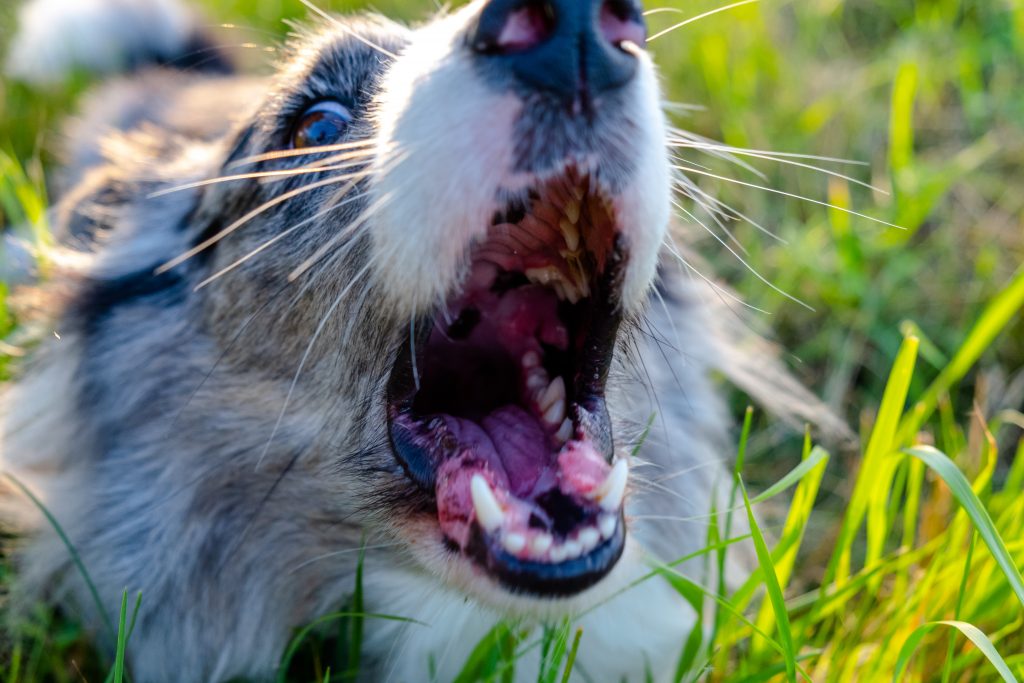Corgis are energetic, playful, loving dogs. They enjoy being around their owners, and they often follow their owners everywhere they go.
Considering how amiable corgis are, one might wonder if they ever get aggressive.
Are corgis aggressive?
Corgis are known to be friendly and playful dogs, but they can also become aggressive due to their protective nature. Corgis can sometimes become feisty, stubborn, and a bit bossy.

While some corgis can be more aggressive than others, you can rectify their behavior with the appropriate training routine.
We offer more details on aggression in corgis in the rest of this article. We also talk about how to stop corgis from becoming aggressive and much more.
Do Corgis Bite a Lot?
As we already mentioned, corgis are playful, fun-loving dogs. But due to their herding instincts, they tend to nip and bite a lot.
When corgis chase predators away from livestock, there is always a lot of biting and barking involved. So, when your corgi nips or bites your ankles, it is imitating its usual herding behavior.
Even when they are not used for herding livestock, they still tend to nip a lot, and in some cases, this could be a sign of aggression.
How Do I Stop My Corgi From Being Aggressive?
Whenever you notice any sign of aggression from your corgi, you should call it to order immediately.
If you do not correct aggression early enough, the corgi may be encouraged to keep at it. Unfortunately, aggressive corgis may become dangerous with time.
Here are a few ways to stop aggression in your corgi:

Train Your Corgi
Giving your corgi obedience training from the early stages is a great way to tame aggression. Waiting too long to train your corgi will make eradicating unwanted behavior almost impossible.
Corgi training tends to be a bit difficult, so before you begin, ensure you avoid using any harsh punishment.
Although training a corgi can help control aggression, it may not be enough, and your dog may still exhibit the signs.
Find the Cause of Their Aggression
To stop aggression in your corgi, start by finding out why it is acting as such.
Aggression in corgis may be caused by an event, a person, or even something within your vicinity. By identifying the cause of their hostility, you have a high chance of reducing the behavior.
Visit the Vet
There are several causes of aggression in corgis, including injury and illness. If you have any reason to believe their aggression is due to illness, or injury, you should see a vet.
Your vet will run the necessary tests to find the cause of the aggression. Once you can resolve any health issues, hostility due to injury should reduce.
Hire a Professional
If you realize there is nothing you can do to curb your corgi’s aggression, you can hire a dog expert.
A professional will adopt several concepts, techniques, and practices that will expose your corgi’s triggers. The dog expert will teach you how to train your corgi to be less aggressive.
While getting a professional might be expensive, it is essential for the safety of your family and the well-being of your dog.

Why You Should Not Get a Corgi
If you need reasons to convince yourself not to get a corgi, here are some downsides to owning one:
Corgis Bark a Lot
One of the many drawbacks of owning corgi is that they bark a lot. Also, they tend to bark at almost anything.
Their excessive barking is one reason why they do not make good apartment dogs. If you have noise-sensitive neighbors, having a corgi could be a problem.
Since corgis are herding dogs, it is natural for them to bark a lot. Although you can train your corgi to reduce how much it barks, you might be unable to reduce it significantly.
Corgis Shed a Lot
If you own a corgi, then you should prepare for a lot of shedding. Corgis shed throughout the year, and the amount of hair they shed varies with each season.
Corgis have a thick double coat that allows them to manage their body temperature and protect themselves. Excessive shedding can pose a real problem for people with dog allergies.
If you are not prepared to constantly clean up dog hair, you should not get a corgi.
Corgis Require Constant Movement
Since corgis were bred for herding livestock, they have high energy levels and do not tire readily.
An idle corgi will become disobedient, destructive, and depressed. This is why managing their energy levels is essential. Corgis require regular exercise for them to be well-behaved. They enjoy playing fetch, hiking, and long walks.
The daily exercise requirements can vary among individual dogs. But generally, you should let them get 1 hour of exercise daily. If you spend a lot of time at work, this might not be feasible.

Corgis Love Food and Require Strict Diets
Due to their love for food, corgis can eventually become overweight. Corgis will do anything for food, and they will continue eating even when they are full.
Due to their tendency for developing back issues ensuring your corgi does not overeat is essential.
When a corgi is overweight, it is more prone to chronic hip, joint, and back problems. Monitor the food intake of your corgi to ensure it does not become overweight.
Health Problems
Corgis are prone to several health problems, including skin allergies and spine problems. Although most of these ailments are not life-threatening, they can still be a problem if their owners are not financially capable.
For instance, a condition like hip dysplasia is quite common among corgis. This condition may require complete hip reconstruction, and this can be pretty expensive.
Signs of Aggression in Corgis
There are several signs you will notice when your corgi is becoming aggressive. These signs will help you get ahead of the situation so you can avoid the worst-case scenario.
Here are some of the early easily identifiable signs of aggression in a corgi:
- Barking and snapping
- Growling
- Lunging
- Curling of lips
- Rigid body posture
- Baring of teeth
- Dominant posture
- Biting
- Staring
What Makes a Corgi Aggressive?
Before you can rectify your corgi’s aggression, you need to figure out the reason for their behavior. Here are some of the common reasons why corgis become aggressive:
Idleness

An idle corgi tends to show signs of aggression when it lacks stimulation both physically and mentally. Inadequate playtime for your corgi will lead to frustration, and this can result in aggressive outbursts.
This type of aggression where a corgi does not get what it wants and becomes frustrated is called redirected aggression.
Poor Socialization
Poor socialization also results in corgis being aggressive towards strangers and other animals.
Corgis tend to be possessive and territorial and will see a stranger or new animal as an intruder. As such, they may attack strange faces if not well-supervised.
Herding Behavior
Corgis were bred to herd livestock. And most of their aggression, like barking and biting, is part of their herding habit.
Most times, these habits are mistaken for hostility.
Lack of Assertive Guidance
Corgis are confident dogs, and if you do not assert your dominance over them, they can become tough to handle. Always let your dog know you are in control to avoid nasty situations.
Health Issues
Your corgi may also be aggressive because of an underlying medical condition. For one, the pain and discomfort from a disease may be driving hostility in your dog.
Internal injuries, intervertebral disc disease, and arthritis could also drive your dog’s hostility. Take your dog to a vet if you suspect any health issues.
Psychological Issues
The main psychological issues here are fear and separation anxiety. When a dog is frightened, it feels the need to defend itself, and it becomes aggressive.
If your corgi feels it is not safe, it begins to act out by avoiding human contact, barking, and whining.
Final Take
Corgis can be aggressive under the influence of specific triggers. However, with the proper training, you can prevent your corgi from becoming violent.
Still, if your corgi does become hostile, the first step to rectifying the hostility is to identify the cause. Once you have identified why your corgi is being aggressive, stopping the aggression becomes less complicated.
Resources:
- https://peteducate.com/are-corgis-aggressive/
- https://corgicare.com/why-do-corgis-bite/
- https://corgicare.com/how-to-stop-aggression-in-corgis/
- https://www.thegoodypet.com/corgi-temperament-are-they-aggressive
- https://corgiadoption.com/why-not-to-get-a-corgi
- https://instacorgi.com/are-corgis-aggressive
- https://stumpsandrumps.com/corgistereotypes/
